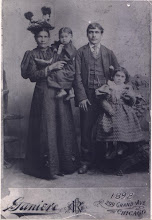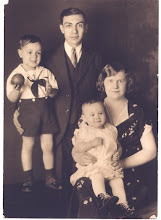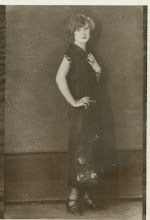**** I've fixed the comment section so it should be usable… Please post COMMENTS, I'd really appreciate it*************
Let's first start with ed il resto niente ("the rest of nothing") the part you all care about. Food. For lunch Nonna made a delicious pasta with cream sauce and bits of prosciutto and funghi, followed by a delicious frittata that she says is an ancient recipe from Il Sud. For dinner we had a light meal of bruschetta (pronounced BRUSKETTA, not BRUSCHETTA) with pomodoro, fagoli or prociutto and formaggio. And I have a surprise for you. The folk song ritual feeding Thais is, apparently, a nightly event and I was able to film it. I have to figure out a way to put this into the blog... I'm pretty technical but this particular blog site doesn't make it obvious... Sorry. There were 3 songs tonight... one was something about little chinese, with a tail, give me a kiss and Thais makes kisses... the next was about a piccolino mushroom... and the other was about a coo coo clock.... she sings coo coo. So cute.
Today was all lessons. A long day because Alessandra is scheduling extra lessons to make up for the fact that we missed yesterday and also because I have to leave 3 days early. Why do I have to leave early? Well, because I have a very special appointment with an author, Luccio Ferri, who's coming down from Milan to Rome just to meet me. He has arranged for us to have special permission access to the archives of the museum of the Risorgimento (The museum where I went last week… chronicles the revolution and unification of Italy and also has special exhibits about immigration, etc.) I could come back to Viterbo for the night, but the following day Margaret and John (sister and brother) arrive, so I'll just stay in Rome. I also have other research I want to do there before we go siteseeing and to visit Il Sud (the South of Italia)
Who is Lucio Ferri? I first read of the Ferri family in another book… "South Italian Festivals" by Herman Tak. Herman is a professor of Anthropology in Amsterdam and he spent a year and a half in Calvello studying its religious festivals and the change in those festivals in relation to what was happening in the town both economically and historically. I presume he chose Calvello partly because many of its ancient festivals are somewhat still in tact. The town is remote but, as Herman explained to me, it wasn't so isolated that it was unaffected or unaware of what was going on in the rest of Italy. In fact, as we will discover, it was right in the thick of things. It is an academic book and I will use it, along with other Italian histories I've been reading, to overlay Calvello history with general Italian history (coming soon).
The internet is an amazing thing. Not only was I able to find both of these books, but I've been writing to both Herman and Lucio with many questions and they have been gracious about answering the questions of this neophyte amateur historian (dare I call myself a historian?) Herman Tak even sent me a booklet published by the city of Calvello that has some history and also lists of the city council in past years (many De/Di Grazias and Gallicchios). Cousin Carrie Sanders also gave me some good general references. I've spent the past year reading my heart out and trying to learn Italian so that I could read some of the really interesting things that came up on Internet searches.
Anyway, I was searching on the Italian equivalent of Amazon.com under Calvello, Basilicata, Lucania etc and I happened to think of searching under Ferri, and VOILA! (Oops, I mean Eccola!) Here was a very recent book, written by Luccio Ferri about his family and the towns of Calvello, Tricarico and Anzi. The title of the book is the same as the title on this post and it was written in 2008. I hope Lucio won't be appalled at the condition of my copy of his book. While it is a short book and I probably could have painfully translated it, I couldn't wait. I had to take it out of its cover, run it through my scanner, page by page, run each page through Google translate, then cut and paste each translated page into a document. I ended up putting it back together with loose leaf rings… do you think he will still autograph it? At this point, I was able to get the "gist" but I can tell that the poetic parts of his writing are lost. I would like to take the time to translate it for you all to read… someday. In the meantime, I'll give you highlights.
Calvello is situated 20 kilometers south of Potenza, the capital of the province of Potenza. It is built on and around a steep hill in the valley of La Terra and a mountain stream flows along the foot of the hill/mountain. The large mountain of Monte VolturIno towers over the area. In the past the only access to Calvello was through muletracks. In fact, in the 1930's Luccio Ferri's mother made the trip by rail as far as Potenza, then by horseback. One road was later built for cars from Potenza.. and not until the 1950's was there any car access from other directions or towns.
In 1748, Calvello had 3650 inhabitants and 747 households. The number of extended families residing together was small, so primarily it was one nuclear family per household averaging 5 people/household. Most families lived in one room, in which the livestock stayed too. Land was often held in title with others,including relatives. Only small parts of land were leased out. There was some communal land on which cereals, primarily wheat, were grown. The fields were only cultivated every 4 or 5 years and corn was grown on the outskirts of town. When not being cultivated the common lands were used for pasture.
Over time, the number of landowners decreased and by the 1800's, there were some larger landowners (as well as the typical smaller peasant holdings) who were termed "galuntuomini" which translates as gentlemen. Basically, this class of people weren't nobility, but were of the upper middleclass; and since no nobility lived in Calvello, they were the top dogs in town. They were referred to as "Don" out of respect. This doesn't mean that they were like Don Corleone, so get that out of your heads right now!. There were a couple of well to do families, including the Ferris; and the other big landowner was the convent/church. Although there was once a noble family who owned lands in Calvello, they were absentee landlords; and most of the land in Calvello was owned by local families.
The first Ferri to come to Calvello was the land manager for that noble family. But the Ferri's also owned land themselves and land as partners with other families. In fact, Lucio's ancestor Ghirardo was partners on one piece of land with a Luigi DeGrazia! Other important individuals in town included a doctor, pharmacist, shoemaker, legale (lawyer..1st level), avocatto (lawyer.. higher level).. notary (an extremely prestigious legal position, not like a notary in the US), the person in charge of the care of the churches (sacristan), and some farmers who owned bigger parcels who were called proprietors. Also there were barbers, shopkeepers, servants, tailors, blacksmiths, carpenters..and, in the 1748 census, 7 people who practiced "custode neri" (magic). The Lucani were very superstitious people and much of their religion is simply pagan practices overlayed with Greek Orthodox overlayed with Catholicism.
Then there were the Contadini, farmers who farmed small parcels they owned... not always located conveniently to their other) holdings (not very efficient). They also might have farmed parcels for other people as tenant/sharecrops orday laborers. Then there were the Branccianti (day laborers who worked for a wage). Another important job was pastore (herdsman): including shepherds, cowherds, swineherds. They might tend their own animals, or combine herds. They also herded the animals to Potenza or Naples for sale. The cow and swine herders migrated south and to the coast with the change of seasons and their families hardly ever saw them. In fact, the branccianti and many of the contadini, also found work in other farming communities throughout the seasons. Like migrant workers, the crops came in at slightly different times, from south to north… and the landowners would exchange laborers at peak periods. That's one of the reasons that these small remote communities really stayed in touch with what was happening politically. Betsy's genealogist said that our great great grandparents parents of Grazia and Genarro) were farmers . Also, that Grazia was a farmer, and that Gennaro was a shepherd. I don't know if that meant they owned land and animals, sheep versus cows etc.
Interestingly enough, although the branccianti (day/wage laborers) were considered less prestigious than those who owned even a small parcel of land, very often their standard of living and true wages were higher than the contadini. Also, interesting is the fact that over time, the generations moved from being contadini (land owners) to wage workers to educated/skilled laborers. Since land meant everything to the peasantry, you would think it would move from wage workers to land owners but that is not the case. Unlike the USA, this migratation from land holders to wage earners had nothing to do with the industrial revolution. It had to do with poor farming economic policies of the Bourbon and Savoy regimes.
Ok, so back to the subject, the Ferri family. Luccio's book describes significant events in each generation of Ferris, starting from the early 1800's until the fascist era. His ancestors were usually mayor or at least on the city councils. They lived through the Napoleon occupancy, two attempted revolutions; in 1821 when Francisco Paulo DiGrazia was murdered… WHO? and in 1848 when Giovanni DeGrazia was imprisoned for treason and sentenced to 25 years in chains (ARE YOU PAYING ATTENTION YET?) and of course the final revolution in 1860 with Garibaldi. Also they lived through epidemics and minor plagues, famines and several earthquakes, including a severe earthquake in 1857 where 100 people in Calvello (and I think, 1000 people in Potenza were killed). They survived the Bourbons, the French, the Austrians, Mussolini and two world wars. The family eventually sold all their property and moved away (partially because of the mass emigration and no laborers). The book finishes with the story of Luccio's father who, though he lived in Rome, then Paris, tried to keep the memory of Calvello alive. He was a brave man who was awarded a medals during the WWII.
Lucio's book is in Italian, written for Italians who already have some knowledge of the history and politics of the era. I had to supplement his book with several others in order to get some understanding of the politics and events. And I'm still having trouble with the motivations of some of the key characters, both in Calvello and in Southern Italy in general. However his book gives brief sketches primarily of the heads of the family in each generation and some glimpses of life in Calvello. There is also a fascinating story of his great grandmother, Michelina. Michelina was the niece, by marriage, of a poorer relation from Anzi, the nearby town. Her father was imprisoned (along with 15000 or so) other men, for political reasons… some of them may have only questioned the Bourbon rule in passing. He was a very good friend of Giovanni DeGrazia who was also imprisoned for a much greater sentence…. Aahh.. the plot thickens. Giovanni is of no known relation but I will write about him later, I promise. Anyway, the head of the Ferri family suggested that his son and daughter-in-law, take in Michelina and raise her as a daughter (they had no children). She had to work hard to earn her keep and had a wicked "stepmother". Talk about a cinderella story. I think her other brothers and sisters stayed with their impoverished mother, but they also may have been "farmed out". Michelina's father became ill with cholera while in prison (on the island of Procida, off Naples… Giovanni was in the same prison). The whole country was enduring an epidemic of cholera, and in Naples, the king had ordered that no cholera would be allowed to spread in Procida… (He was taking some heat for the injustices from the British press). Anyway, Michelina's father was moved to Calvello where he was "imprisoned", presumably to die. He recovered however and every day Michelina went to visit him and that is how she, a girl, learned to read and write. She compiled a history of her life "The Joys and Sorrows of My Life" and it is interesting to learn about the life of a woman of her class. While the Ferris were considered very rich by Calvello standards, and had influential friends in Potenza and Naples; they didn't have a super high life style as compared to nobility. Michelina cooked and if they had servants, they didn't have many. (There were only 7 servants in total in Calvello in 1798.) And, most likely, back in the high society of nobility in Naples they were probably still considered "country bumkins" (people being who they are).
Very likely, our great grandparents worked for the Ferri family. So, that is who Lucio Ferri is. And I have pages of questions for him. And we're going to have access to some archival materials… not that I will be much help reading or researching; but I'll try. He's a really nice man and around Christmas I emailed him with some information I found about Michelina's father and he replied that he was busy trying to find out more about Francesco Paulo DiGrazia!!! (How cool is that?)
Ok, I have homework assigned.. and you have to digest this long post. Ciao for today!
Maria






Does anyone know who this Maria person is - the person who keeps writing these? I'm looking for my wife Mary and there is little resemblance (just joking - really....). I am so impressed and proud of you!!!!!!
ReplyDeleteBe careful Rob. Maria may come home and want to "treat" you to some "gastric adventures".
ReplyDelete